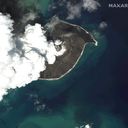NASA estimates Tonga volcano exploded with force of 5-6 megatons of TNT equivalent

NASA scientists estimate that the power of Tonga's volcanic eruption over the weekend was equivalent to 5-6 megatons of TNT.
Threat level: Saturday's eruption of the Hunga Tonga-Hunga Haʻapai volcano and subsequent tsunami killed at least three people. Scientists warn an "ash-seawater cocktail" poses a potentially toxic health threat, and drinking water could be contaminated.
#NASAWorldview Image of the Week: Explosive Eruption of #HungaTonga - Hunga Ha'apai Volcano as observed on Jan. 15, 2022 by the ABI instrument aboard the @NOAA GOES-West satellite. Learn more: https://t.co/1qBhuelg3J GeoColor Imagery provided by NOAA/NESDIS/STAR pic.twitter.com/yRkR0bfg9U
— NASAEarthdata (@NASAEarthData) January 18, 2022
The big picture: The volcanic eruption was so powerful, its sonic booms could be heard nearly 6,000 miles away in Alaska.
- The total kinetic energy of the primary explosion was initially estimated to be 10 megatons of TNT equivalent. This was later revised down to a still-powerful amount that was "no larger than 5-6 megatons of TNT equivalent," said Jim Garvin, chief scientist at NASA's Goddard Space Flight Center.
- "This estimate does not include the thermal energy released," added Garvin in his email to Axios on the preliminary findings.
Meanwhile, satellite images and photos taken on surveillance flights show significant damage on the main island of Tongatapuatu, where ash and dust have hampered relief efforts.
- New Zealand's Ministry of Foreign Affairs warns that an undersea cable that's largely cut off communications to Tonga "will take at least four weeks" to be repaired.
What to watch: Cornell University scientists leading NASA-funded research into volcanic ash impacts warn that "in addition to the direct damage to infrastructure from the ash layer and tsunami, the thick ash blanket presents extraordinary health and environmental hazards — amplified by seawater's interaction with the ash particles," per a university statement.
What they're saying: Adrian Hornby, a postdoctoral research associate on the NASA project, noted in a statement that previous studies at Hunga Tonga-Hunga Haʻapai had "shown that the ash carries some of the highest burdens of salts ever recorded, which may contain highly toxic species such as sulfur, chlorine and fluorine."
- "These salts get deposited with the ash and can be easily leached by rainfall, causing an immediate hazard to water quality, agriculture and the natural environment," Hornby added.
- Matthew Pritchard, a co-principal investigator on the NASA project, said water and magma produce "very fine ash particles that can spread over a broad region." Satellite detection indicates hydrogen chloride concentrations "at higher than usual levels in the atmosphere over Tonga," he noted.
Go deeper: Tonga volcano isn't going to cool the planet
Editor's note: This article has been updated with comment from New Zealand's Ministry of Foreign Affairs.